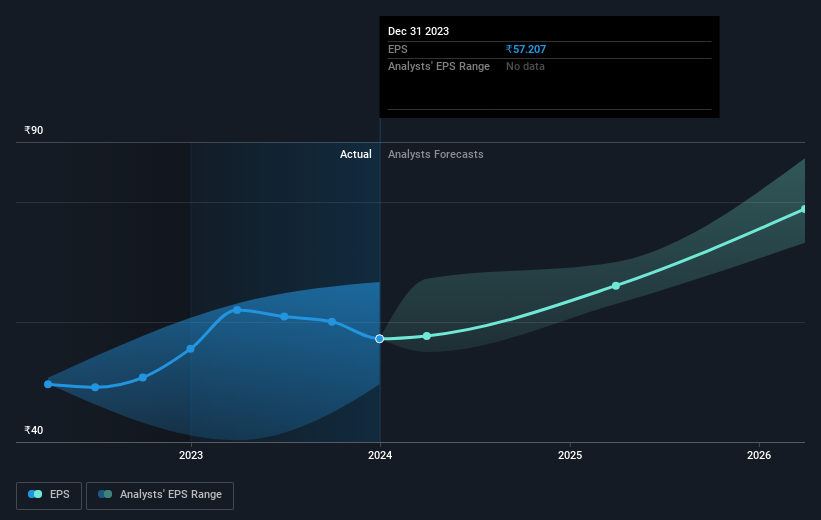- India
- /
- Diversified Financial
- /
- NSEI:PNBHOUSING
PNB Housing Finance's (NSE:PNBHOUSING) three-year earnings growth trails the solid shareholder returns

PNB Housing Finance Limited (NSE:PNBHOUSING) shareholders might be concerned after seeing the share price drop 11% in the last quarter. In contrast, the return over three years has been impressive. The share price marched upwards over that time, and is now 110% higher than it was. It's not uncommon to see a share price retrace a bit, after a big gain. If the business can perform well for years to come, then the recent drop could be an opportunity.
Since the stock has added ₹8.2b to its market cap in the past week alone, let's see if underlying performance has been driving long-term returns.
View our latest analysis for PNB Housing Finance
To quote Buffett, 'Ships will sail around the world but the Flat Earth Society will flourish. There will continue to be wide discrepancies between price and value in the marketplace...' One imperfect but simple way to consider how the market perception of a company has shifted is to compare the change in the earnings per share (EPS) with the share price movement.
PNB Housing Finance was able to grow its EPS at 16% per year over three years, sending the share price higher. This EPS growth is lower than the 28% average annual increase in the share price. So it's fair to assume the market has a higher opinion of the business than it did three years ago. It's not unusual to see the market 're-rate' a stock, after a few years of growth.
The graphic below depicts how EPS has changed over time (unveil the exact values by clicking on the image).

We're pleased to report that the CEO is remunerated more modestly than most CEOs at similarly capitalized companies. But while CEO remuneration is always worth checking, the really important question is whether the company can grow earnings going forward. It might be well worthwhile taking a look at our free report on PNB Housing Finance's earnings, revenue and cash flow.
What About The Total Shareholder Return (TSR)?
We've already covered PNB Housing Finance's share price action, but we should also mention its total shareholder return (TSR). The TSR is a return calculation that accounts for the value of cash dividends (assuming that any dividend received was reinvested) and the calculated value of any discounted capital raisings and spin-offs. PNB Housing Finance's TSR of 153% for the 3 years exceeded its share price return, because it has paid dividends.
A Different Perspective
It's nice to see that PNB Housing Finance shareholders have received a total shareholder return of 80% over the last year. That's better than the annualised return of 4% over half a decade, implying that the company is doing better recently. Given the share price momentum remains strong, it might be worth taking a closer look at the stock, lest you miss an opportunity. I find it very interesting to look at share price over the long term as a proxy for business performance. But to truly gain insight, we need to consider other information, too. For example, we've discovered 2 warning signs for PNB Housing Finance that you should be aware of before investing here.
For those who like to find winning investments this free list of growing companies with recent insider purchasing, could be just the ticket.
Please note, the market returns quoted in this article reflect the market weighted average returns of stocks that currently trade on Indian exchanges.
New: Manage All Your Stock Portfolios in One Place
We've created the ultimate portfolio companion for stock investors, and it's free.
• Connect an unlimited number of Portfolios and see your total in one currency
• Be alerted to new Warning Signs or Risks via email or mobile
• Track the Fair Value of your stocks
Have feedback on this article? Concerned about the content? Get in touch with us directly. Alternatively, email editorial-team (at) simplywallst.com.
This article by Simply Wall St is general in nature. We provide commentary based on historical data and analyst forecasts only using an unbiased methodology and our articles are not intended to be financial advice. It does not constitute a recommendation to buy or sell any stock, and does not take account of your objectives, or your financial situation. We aim to bring you long-term focused analysis driven by fundamental data. Note that our analysis may not factor in the latest price-sensitive company announcements or qualitative material. Simply Wall St has no position in any stocks mentioned.
About NSEI:PNBHOUSING
Solid track record and good value.
Similar Companies
Market Insights
Community Narratives



